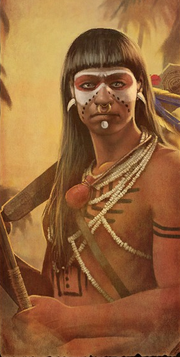
The Caribs, also known as the Kalinago, are a Native American people in South America and the Caribbean islands, to whom the Caribs give their collective name. The Carib people are believed to have migrated from the rainforests of modern Venezuela to several of the more eastern and southern islands in the Caribbean, which takes its name from the tribe. They were skilled dugout canoe builders and had the use of sails. They were the fiercest warriors in the area, adept with the blowgun and bow and arrow. Unlike the more peaceful neighboring tribes they displaced, the Carib culture valued the exploits of warriors most highly. The Spanish tended to avoid Carib-controlled islands after a number of early skirmishes.
Carib cannibalism was reported by Christopher Columbus and other Spanish explorers, and may have been part of their religious rituals and war practice. In 1503, Queen Isabella of Castile ruled that canninals could be taken legally for slaves, providing an incentive to identify potential laborers as such. By the 17th century, other European nations wanted the Carib islands for sugar plantations and the local population was almost annihilated. In 1796 the British deported most of the remaining 5,000 Caribs to an island off Honduras. They spread from there into the mainland and survive today in Guatemala and on a reservation in Dominica. Words of Carib origin that remain in common use today include hammock, iguana, and hurricane.
